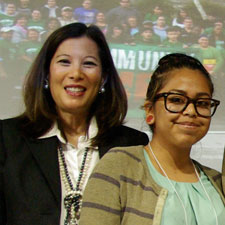Justices tout civics learning as key to democracy
By Laura Ernde
Staff Writer
SACRAMENTO – Sandra Day O’Connor confessed that she hated
taking civics education classes when she was in school.
“I found them tiresome and boring,” she told a group of
several hundred educators, students, lawmakers, lawyers and judges who gathered
Feb. 28 for “Civic Learning California Summit: Making Democracy Work.”
 |
Chief Justice Tani Cantil-Sakauye with student Diana Ledezma.
Photo by Brian Simeroth, Administrative Office of the Courts |
The retired U.S. Supreme Court justice said she surprised
herself by taking up the cause for civics education across the country. As
evidence of the crisis, she referred to a 2010 assessment that found that less
than half of eighth graders knew what the Bill of Rights was about. “And it’s
right there in the title,” she said incredulously. “This is bad.”
“This country matters to me, to you, to all of us, and frankly
to the world,” said O’Connor, who founded iCivics.org,
which uses online games to teach students about the rule of law.
California Chief Justice Tani G. Cantil-Sakauye brought
together the committee of civic
leaders that organized the summit, aimed at raising awareness of the issue.
As a wife and mother of two daughters, Cantil-Sakauye said the upcoming
challenges facing California will only be solved by understanding that
democracy is the key to change. For democracy to work, participation is
essential.
“It is a use-it-or-lose-it proposition,” said the chief. The
court’s website has civics
education resources for judges, court staff and attorneys.
Secretary of State Debra Bowen spoke at the summit about her
early days as a student activist, organizing protests over faculty censorship
of her student newspaper and a policy against allowing girls to wear pants.
“I learned it is never wrong to stand up for what is right,”
she said.
Cantil-Sakauye and Superintendent of Public Instruction Tom
Torlakson presented the first-ever Civic
Learning Awards to schools that have done an exemplary job teaching civic
engagement.
Diana Ledezma, a senior at Alliance Judy Ivie Burton
Technology Academy in South Los Angeles, which earned an Award of Excellence,
talked about casting her very first vote for President Barack Obama in
November.
“The feeling is so wonderful. You feel like you have a
say,” she said.
Joseph Dunn, CEO and Executive Director of the State Bar,
said history has shown that if you try to change the world you will fail.
However, if you change one piece of the world, that change can lead to bigger
changes and eventually change the world.
Dunn, a former senator, introduced four state lawmakers who are supporters of civics
education. They included Sen. Leland Yee, D-San Francisco, who introduced SB 619, which calls for civics education for state employees.
Yee said the need for civics
education hit home for him when he was running for San Francisco Board of
Education in 1986 and many in his Chinese-American community refused to
register to vote because they didn’t want to be called for jury duty. He tried
to get them to think about what would happen if they ever went before a jury
and there were no peers.
“Now I’ve become a passionate advocate for civics
education,” he said.